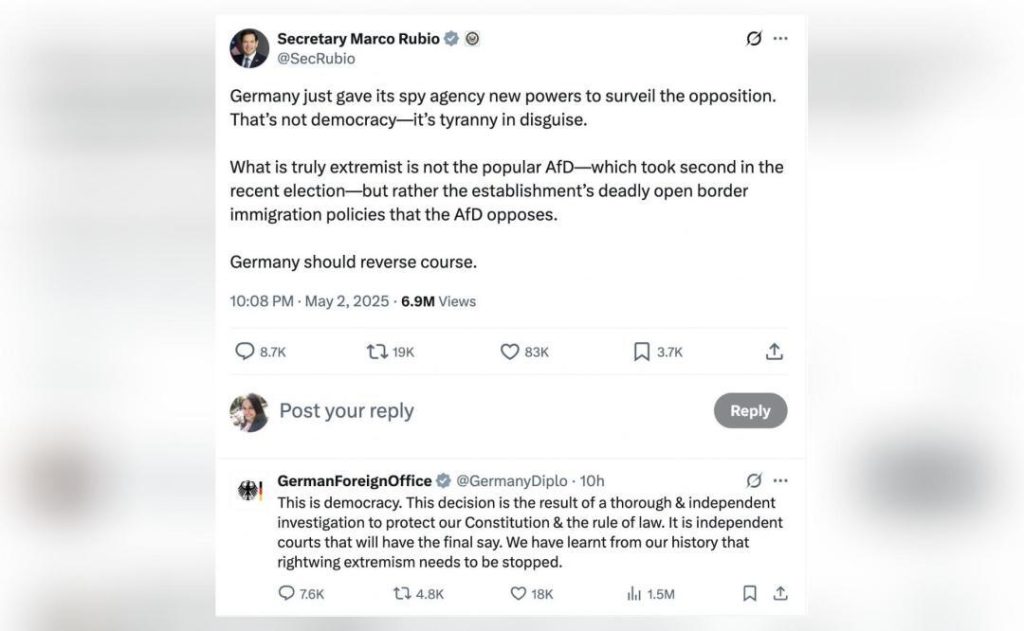
US Secretary of State Marco Rubio & German Govt Clash Over AfD Party’s ‘Extremist’ Tag
The diplomatic spat between the United States and Germany has escalated, with US Secretary of State Marco Rubio taking a strong stance against Germany’s decision to term the far-right Alternative for Germany (AfD) party as “extremist”. The disagreement has sparked heated debate, with Rubio accusing Germany of enabling “tyranny in disguise” and the German government defending its decision as necessary to protect the country’s Constitution.
The controversy began when Germany’s Federal Office for the Protection of the Constitution (BfV) designated the AfD party as “extremist” in its annual report. The BfV, the country’s domestic intelligence agency, accused the AfD of promoting “anti-constitutional” views and sympathizing with right-wing extremist groups. The agency’s decision was based on a thorough investigation and was aimed at protecting the German Constitution.
However, US Secretary of State Marco Rubio disagreed with the German government’s stance, calling it “a grave mistake”. Rubio took to Twitter to express his disappointment, stating that the decision was “a result of political correctness, not a commitment to truth or justice”. He added that the move would only serve to “embolden the extremist forces in Germany and throughout Europe”.
Rubio’s remarks sparked a sharp response from the German government, with the Foreign Ministry issuing a statement rejecting the US Secretary of State’s criticism. The statement emphasized that the decision to term the AfD party as “extremist” was the result of a thorough investigation to protect the German Constitution. The ministry added that the BfV’s designation was not a political decision, but rather a professional assessment based on the agency’s findings.
The German government’s stance was supported by other European countries, with many expressing concerns over the rise of right-wing extremism in Germany. The European Commission, the executive body of the European Union, also welcomed the BfV’s decision, stating that it was necessary to combat hate speech and promote democratic values.
The controversy has raised questions about the role of intelligence agencies in identifying and combating extremism. The BfV’s designation of the AfD party as “extremist” has been criticized by some as an overreach of the agency’s powers, while others have praised the move as necessary to protect the German Constitution.
The disagreement between the US and German governments has also highlighted the challenges of combating right-wing extremism in the face of growing political polarization. The AfD party, which was founded in 2013, has gained popularity in Germany by tapping into public discontent with the country’s migrant policies and perceived failures of the mainstream parties.
The party’s leader, Alexander Gauland, has been criticized for his controversial statements, including his assertion that the Nazi regime was not particularly brutal. Gauland has also been accused of promoting anti-Semitic and xenophobic views, although he has denied these allegations.
The controversy has also sparked debate over the role of the US in combating right-wing extremism in Europe. The US has a long history of involvement in European politics, particularly in the area of counter-terrorism. However, the US government’s stance on the AfD party has been criticized as inconsistent, with some arguing that the party’s views are not compatible with American values.
In conclusion, the clash between US Secretary of State Marco Rubio and the German government over the AfD party’s “extremist” designation has highlighted the complexities of combating right-wing extremism in the face of growing political polarization. While the BfV’s decision has been praised by some as necessary to protect the German Constitution, others have criticized it as an overreach of the agency’s powers. The controversy serves as a reminder of the challenges of promoting democratic values and combating extremism in a rapidly changing world.



